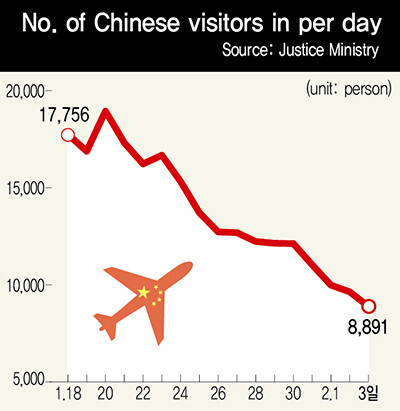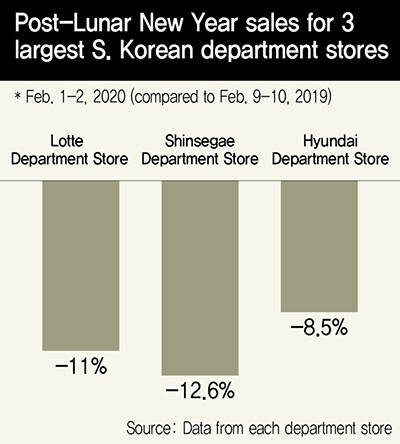hankyoreh
Links to other country sites 다른 나라 사이트 링크
S. Korea’s department stores and retail hit hard by coronavirus

On the afternoon of Feb. 4, I visited the main branch of the Shinsegae Department Store, in downtown Seoul. The luxury brand outlets on the first floor, which are usually bustling with Chinese shoppers, were disturbingly quiet. Just three or four of the 10 shops there, representing brands like Louis Vuitton and Chanel, had any customers. The situation was the same at regular clothing stores on the upper floors.
“At some of the better-known brand stores, Chinese tourists used to line up outside, waiting to enter, even during the day on weekdays. Nowadays, though, it’s fair to say that even the regular outlets are hardly getting any customers. Even though items are on sale, there’s been a marked decrease in the number of shoppers because of the coronavirus,” said an employee at one clothing store.
Earlier, when I dropped by a dakgalbi (pan-fried chicken) restaurant near Ewha Womans University around lunch time, I didn’t see a single customer inside. The restaurant is a favorite spot for Chinese tourists, and several Mandarin signs are on display.
“At normal times, we get about 100 customers a day. Most of them are from China, Hong Kong, and Taiwan. But over the past few days, since news broke about the coronavirus, we’ve been getting fewer than 10 customers. I’ve been having trouble sleeping at night because of our awful sales,” the owner of the restaurant told me.

There’s also been a steep decline in the number of people taking the train. The number of train passengers this past weekend was down 26.1% year on year (46,000 on the KTX and 44,000 on regular trains).
“This past weekend alone, sales were 2 billion won (US$1.68 million) lower than normal. If the coronavirus outbreak lasts for three months, we expect to face 100 billion won (US$84.11 million) in losses,” said Son Byung-seok, president of the Korea Railroad Corporation (KORAIL), in a press conference on Tuesday.
The outbreak of the novel coronavirus is causing customers to pull tight their purse strings. As people shy away from typically crowded shopping centers, all major department stores are simultaneously suspending operations and duty-free stores — where Chinese account for about 80% of their total sales — are shortening their opening hours. While retail sales had started to bounce back in the second half of 2019, that trend has been quashed by the coronavirus outbreak, which is also souring consumer sentiment. There’s an increasing likelihood that the government will have to revise its economic projection of 2.4% growth for this year, which assumed that spending would gradually rise, fueled by an increase in tourism from overseas.
The department stores that are a key conduit for consumption are nearly all taking a day off on Feb. 10 to be disinfected. That goes for all branches of Lotte Department Store and Shinsegae Department Store and all but two of Hyundai Department Store’s 13 branches. Never before have department stores taken a day off because of customer anxiety. That didn’t even happen during the outbreaks of MERS (Middle Eastern Respiratory Syndrome) in 2015 or of SARS (Severe Acute Respiratory Syndrome) in 2002.
Department store sales have already taken a hit. This past weekend (Feb. 1-2), sales at Lotte Department Store were 11% lower than during the first weekend after the Lunar New Year holiday last year (Feb. 9-10); Shinsegae and Hyundai saw their department store sales fall by 12.6% and 8.5%, respectively, during the same period.
Duty-free stores, which rely on Chinese tourists for a big share of their sales, have shortened their opening hours. Some of the outlets of Lotte Duty Free and Shinsegae Duty Free, which usually close at 8-9 pm, have pulled back closing time to 6 pm. With fewer Chinese customers around, duty-free stores are halting operations in the evening, when sales tend to be lower than during the daytime.
Immigration figures provided by South Korea’s Ministry of Justice show that the average number of daily arrivals has plunged from 15,000 before the coronavirus outbreak to around 8,900 as of Feb. 3. Duty-free stores had been seen as a sign of an economic recovery, with their sales this past December up 43.2% from the previous year.
“In the short term, demand will drop mainly in the dining, tourism, and hotel industries, mostly hitting small business owners. We have to regard this as a serious psychological shock, and its impact could continue depending on how many more people are infected and on whether there are any fatalities,” said Ha Jun-gyeong, professor of economics at Hanyang University.
“We’re worried about two things [in regard to the novel coronavirus]: a contraction in the domestic market in China and a contraction in the domestic market in South Korea because of a decrease in Chinese tourists. Domestic consumer sentiment will keep contracting at least through February and possibly into March,” said Ju Won, head of economic research at the Hyundai Research Institute.
Online consumption increases as people stay at home
But there are also indications of consumer behavior that could partially offset the spending shock. As people avoid going outside, they’re spending more online. On Jan. 28, video streaming service Watcha reported that its minutes watched had increased by 14.1% from the previous week, setting a weekday record. Figures released by online shopping outlet 11Street show that twice as many staple goods were bought between Jan. 27 and Feb. 1 as during the same period last year.
“We’re tracking several kinds of data, but the biggest factor right now is that people just aren’t going outside. Under such circumstances, it’s inevitable that consumption will contract. The intensity and duration of that contraction will depend on the number of infections in China going forward,” said a senior official with South Korea’s Ministry of Economy and Finance.
By Shin Min-jung, Kim Yoon-ju, and Lee Kyung-mi, staff reporters
Please direct comments or questions to [english@hani.co.kr]

Editorial・opinion
![[Column] Park Geun-hye déjà vu in Yoon Suk-yeol [Column] Park Geun-hye déjà vu in Yoon Suk-yeol](https://flexible.img.hani.co.kr/flexible/normal/500/300/imgdb/original/2024/0424/651713945113788.jpg) [Column] Park Geun-hye déjà vu in Yoon Suk-yeol
[Column] Park Geun-hye déjà vu in Yoon Suk-yeol![[Editorial] New weight of N. Korea’s nuclear threats makes dialogue all the more urgent [Editorial] New weight of N. Korea’s nuclear threats makes dialogue all the more urgent](https://flexible.img.hani.co.kr/flexible/normal/500/300/imgdb/original/2024/0424/7317139454662664.jpg) [Editorial] New weight of N. Korea’s nuclear threats makes dialogue all the more urgent
[Editorial] New weight of N. Korea’s nuclear threats makes dialogue all the more urgent- [Guest essay] The real reason Korea’s new right wants to dub Rhee a founding father
- [Column] ‘Choson’: Is it time we start referring to N. Korea in its own terms?
- [Editorial] Japan’s rewriting of history with Korea has gone too far
- [Column] The president’s questionable capacity for dialogue
- [Column] Are chaebol firms just pizza pies for families to divvy up as they please?
- [Column] Has Korea, too, crossed the Rubicon on China?
- [Correspondent’s column] In Japan’s alliance with US, echoes of its past alliances with UK
- [Editorial] Does Yoon think the Korean public is wrong?
Most viewed articles
- 1[Column] Park Geun-hye déjà vu in Yoon Suk-yeol
- 2Thursday to mark start of resignations by senior doctors amid standoff with government
- 3N. Korean hackers breached 10 defense contractors in South for months, police say
- 4Kim Jong-un expressed ‘satisfaction’ with nuclear counterstrike drill directed at South
- 5[Editorial] New weight of N. Korea’s nuclear threats makes dialogue all the more urgent
- 6Will NewJeans end up collateral damage in internal feud at K-pop juggernaut Hybe?
- 7[Column] ‘Choson’: Is it time we start referring to N. Korea in its own terms?
- 8[Editorial] Japan’s rewriting of history with Korea has gone too far
- 9[Cine feature] A new shift in the Korean film investment and distribution market
- 10[Column] The president’s questionable capacity for dialogue